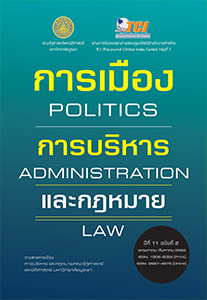Legal Problems on Execution of Fine Punishment Sent by Registered Mail with Acknowledgement form According to the Land Traffic Act, B.E. 2522
Keywords:
Laws relating to land traffic, Petty offences, ProceedingsAbstract
The legislative intent of the Land Traffic Act, B.E. 2522 (1979) is to require people using vehicles and roadways to conform to rules and regulations by which criminal penalty is to be used to control wrongdoers. This wrongdoing is considered as mala prohibita. However, most criminal penalties according to what are stipulated in this Act are only petty offences punishable only with fine. Furthermore, it is also stated in Section 37 of the Criminal Procedure Code that criminal cases may be settled in the case that the alleged offender paying the fine as fixed. In addition, it is also stated in Section 39 (3) that by settlement of the offence in accordance with Section 37, the right to institute a criminal prosecution is extinguished. Consequently, the procedure of criminal cases punishable only with fine as mentioned in the Criminal Procedure Code is shortened because the state does not want the cases being brought to the court except the offender refuses to pay the fine. Also, Section 140 of the Land and Traffic Act states that upon finding a traffic violation in the event of the driver is nowhere to be found, a written order shall be left on the vehicle or sent by registered mail with acknowledgement form to the domicile of the owner or possessor of the car with regard to a lawsuit that this person is the driver (Paragraph 5 in Section 141). In case that this person has rightfully received the written order, he may choose to pay the fine by any means as stipulated in Section 141 (1) (2) and (3) of the Land and Traffic Act. In case the offender refuses to report to the inquiry officer or to pay the fine, under this Act in Section 141 bis. , the inquiry officer shall issue a summon for verbal warnings and paying the fine or request the officers of the Department of Land Transportation to deny accepting of annual tax payment of the said car. The enforcement under this Act always creates problems for the enforcers. However, the law enforcement cannot be applied in case the offence has been committed exceeding one year, of which the prescription shall be precluded according to Section 95 (5) of the Criminal Code. Moreover, Section 155 states that any person who refuses to pay the fine after having rightfully received the written order shall be liable to commit another offence punishable with the fine not exceeding one thousand Baht. According, it is obvious that the provision in the procedure of enforcement to offenders of the law relating to land traffic has not only created difficulties to both the people and the enforcers but is also irrelevant to criminal theories concerning Cesare Beccaria’s Limiting Principles and Utilitarianism and the pragmatic approach. Upon consideration of criminal procedure in the and inconsistency with criminal theory principles should be cancelled. Instead, government measures should be brought for enforcement by stipulating conditions. The condition of refusing to pay for the fine should be fixed as the condition for renewal of the driving license. Furthermore, administrative measures concerning mark deduction of the driving license should replace denying acceptance of annual tax payment of the offended car.
Downloads
Published
Issue
Section
License

This work is licensed under a Creative Commons Attribution-NonCommercial-NoDerivatives 4.0 International License.






